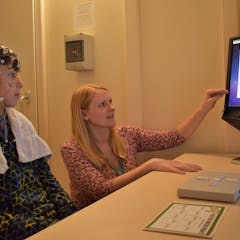
Articles on Brain development
Displaying 1 - 20 of 67 articles

Most children will eventually consume news and current affair programs, but is there a way for parents to minimise the impacts of distressing media?

During the pandemic, many people relied on social media for distraction and social connection. However, excessive social media use can negatively affect mental health, especially for young people.

Studies show that smoking marijuana during pregnancy can lead to premature birth, lower birth weight and psychological problems in the newborn.

At about four, children start to understand that someone’s behaviour depends on what that person believes.

The impact of early childhood trauma on lifelong physical and mental health makes it urgent to invest in programs to support healthy pregnancies and stable, caring very early childhoods.

From figuring out where memories are stored to how sensory information translates to behavior, new technologies are helping neuroscientists better understand how the brain works.

Parents are often the primary source of information that children receive from their environment. How consistent parents’ interactions with their children are matters.

Children who grow up in disadvantaged areas seem to react more strongly to facial expressions showing anger or fear. But social connections between neighbours can help.

Kids often crave processed sugary foods. But research shows that consuming too many treats during childhood and adolescence may lead to behavioral and emotional problems.

It will cost tens of billions of dollars to find and remove all the lead service lines that deliver water to US homes and schools. A public health expert explains why he sees it as money well spent.

Understanding how brain folding works could help researchers better diagnose and treat neurodevelopmental disorders.

Children with dyslexia seem to find it more difficult to judge the direction of moving dots - this could explain why reading is also more challenging.

A new study shows that the pesticide pyriproxyfen – widely used in Brazil during the Zika outbreak of 2015 – could disrupt thyroid hormones and thus affect brain development in children.

Tilly Edinger was the first person to apply a deep-time perspective into different species’ brain evolution. She did this by focusing on the hollow space within a dead animal’s skull.

The early childhood years, particularly ages 0-3, are the building blocks of life.

Social disadvantage can cause stress that leads to changes in ‘connectivity’ between brain regions, potentially harming adolescents’ ability to plan, set goals, and self-reflect.

Research on the brain’s development could help explain why mental health problems often arise first during adolescence.

The babies born since March 11 2020 have faced a unique set of challenges.

The adolescent brain is particularly vulnerable to experience. Puberty is is the time brain networks are hardwired around milestone events. We should help teenagers make meaning of the pandemic.

Our study joins a growing body of evidence that suggests caesarean sections may have more consequences than previously thought.
